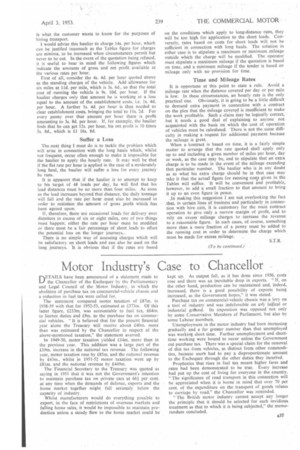Motor Industry's Case to Chancellor
Page 63

If you've noticed an error in this article please click here to report it so we can fix it.
DETA1LS have been announced of a statement made to the Chancellor of the Exchequer by the Parliamentary and Legal Council of the Motor Industry, in which the abolition of purchase tax on commercial-vehicle chassis and a reduction in fuel tax were called for.
The statement compared motor taxation of £87m. in 1938-39 with that for 1952-53, estimated at £373m. Of this latter figure, £233m. was accountable to fuel tax, £64m. to licence duties and £9m. to the purchase tax on commercial vehicles. "It is believed that for the present financial year alone the Treasury will receive about I40m. more than was estimated by the Chancellor in respect of the above-mentioned taxation," the statement averred.
In 1949-50, motor taxation yielded £14m. more than in the previous year. This addition was a large part of the £19m. increase in the national tax revenue. The following year, motor taxation rose by £85m. and the national revenue by £43m., whilst in 1951-52 motor taxation went up by Mtn. and the national revenue by £449m.
The Financial Secretary to the Treasury was quoted as saying in 1951 that it was not the Government's intention to maintain purchase tax on private cars at 663per cent. at any time when the demands of defence, exports and the home market together might fall seriously below the capacity of industry.
Whilst manufacturers would do everything possible to export, in the face of restrictions of overseas markets and falling home sales, it would be impossible to maintain production unless a steady flow to the home market could be kept up. As output fell, as it has done since 1950, costs rose and there was an inevitable drop in exports. "If, on the other hand, production can be maintained and, indeed, increased, there is a good possibility of exports being increased, as the Government hopes," it was stated.
Purchase tax on commercial-vehicle chassis was a levy on a tool of industry and was indefensible on ativ logical or industrial grind. Its imposition was opposed not only by some Conservative Members of Parliament, but also by some Labour members.
Unemployment in the motor industry had been increasing gradually and a far greater number than that unemployed was working short time. Further unemployment and shorttime working were bound to occur unless the Government cut purchase tax. There was a special claim for the removal of this tax from vehicles, as distinct from other commodities, because users had to pay a disproportionate amount to the Exchequer through the other duties they incurred.
Prophecies that rises in fuel tax meant higher fares and rates had been demonstrated to be true. Every increase had put up the cost of living for everyone in the country. "The significance of road transport in this connection will be appreciated when it is borne in mind that over 70 per cent, of the expenditure on the transport of goods relates to carriage by road," the Chancellor was reminded.
" The British motor industry cannot accept any longer the principle that it should be selected for such invidious treatment as that to which it is being subjected," the memorandum concluded.




























































































